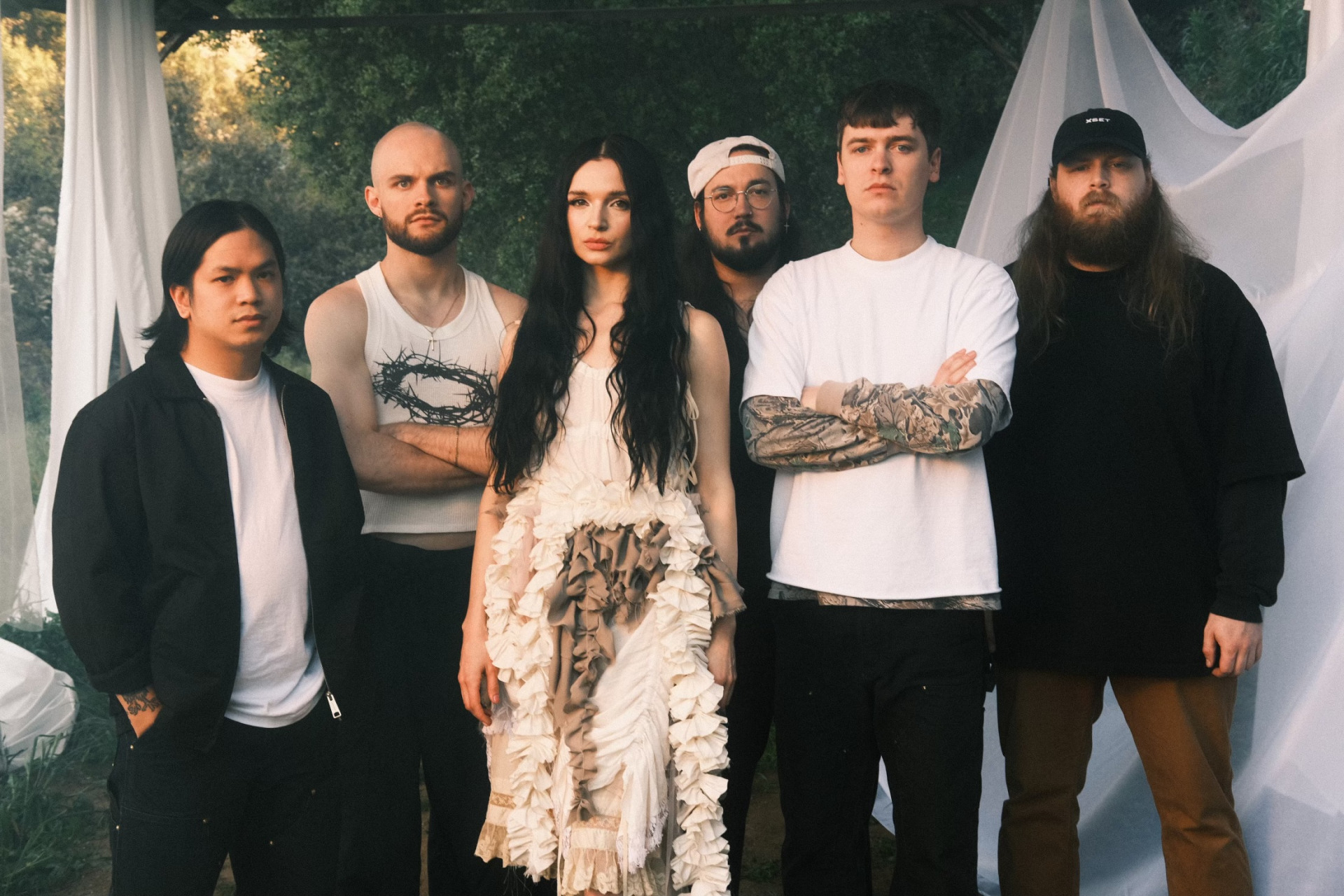
Top Albums of 2016, by Greg Majewski
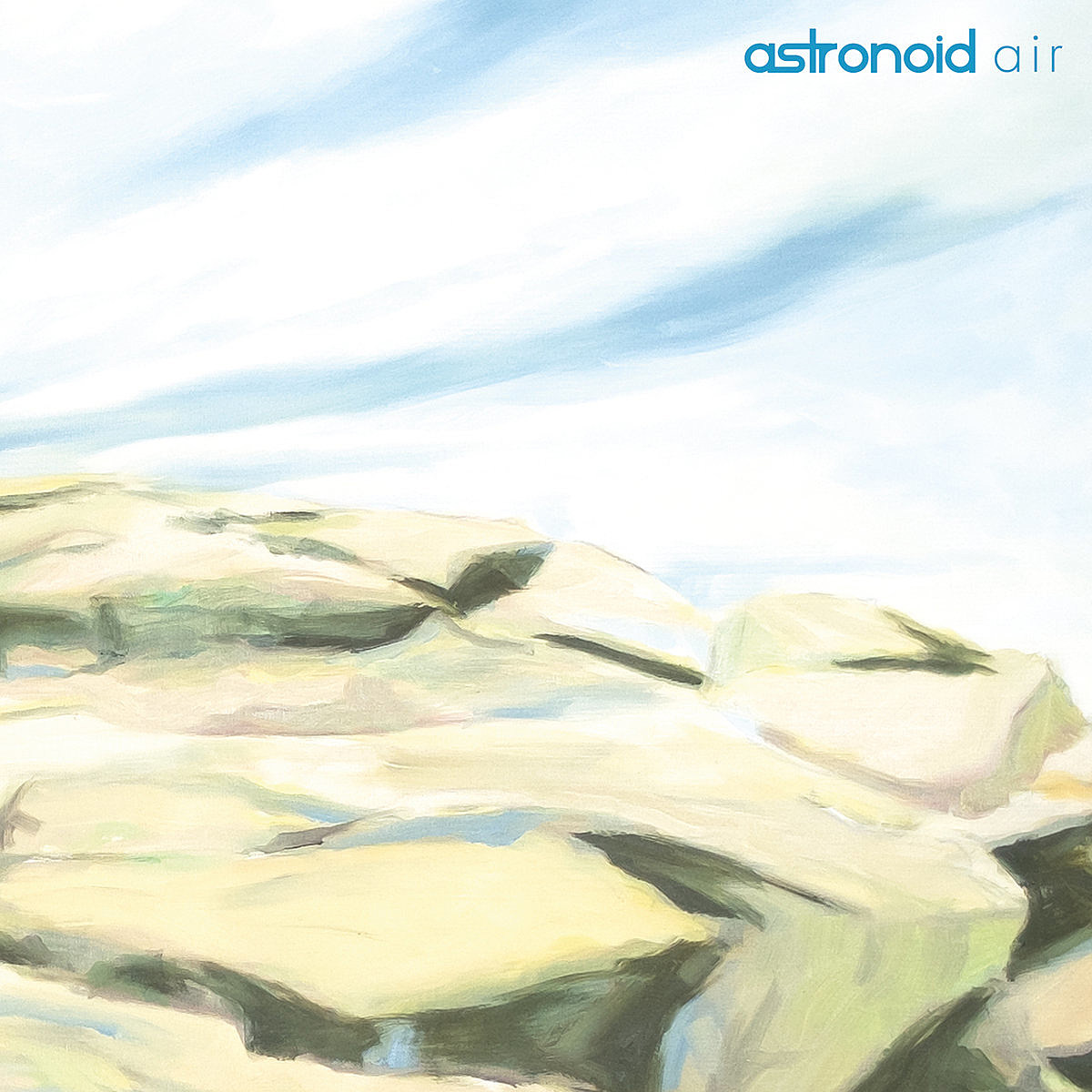
…
Another year, another phenomenal collection of metal albums. It seems like each year since about 2010 critics, fans and musicians have looked back on the previous 12 months of heavy tunes appalled not only by the sheer amount of metal dropped on our willing craniums, but by the amount of truly outstanding metal that’s come tumbling down the chute. It’s absolutely crushing, that favorite adjective among metal scribes. It’s also enough to overwhelm even the heartiest of listeners, let alone individuals whose job it is to sort through all (or most) of the brutal bounty, wading through a barrage of promos each day searching for those precious albums that might make him or her swoon with delight.
For me, those came in a few flavors this year. The most noticeable presence on my 2016 list being a few albums by big-time, big label acts. Now, what I consider “big-time” and what someone who jams Carly Rae Jepsen (okay, guilty) would consider big-time may be two different things. In this case, I’m not necessarily referring to a “major” in the traditional sense of the word. This is extreme music, after all. Rather, I’m talking about anything from a well-known label with the capital to promote its artists in more than just a half-page ad in Decibel. My list this year contains the most such bands I can recall in the decade I’ve been compiling these either personally or (semi-)professionally. My tastes have steadily skewed more “underground” (whatever that words means anymore) over the years, as I’ve grown exhausted by the clockwork release cycle and predictable trends of Big Metal. You can only be let down by so many highly touted releases before you tune out the PR chatter altogether and bury yourself in name-your-price Bandcamp pages. But, for a few albums this year, I’m glad I gave into the hype and clicked “play.” So good was one such album that it almost topped my list, were it not for a gorgeous little record that came out of nowhere and tapped deep into my dopamine receptors. Thus, 2016 was a year of giants and giant killers, big-time players and sleepers. So let me stop blathering about the year that was and instead start blathering about the actual music.
Non-metal album of the year:
The Hotelier – Goodness (Tiny Engines, USA)
Who’d have thought the most controversial cover of the year would come from an indie rock band instead of some goregrind solo project. A couple guys photograph a group of willing octogenarian nude models and iTunes slaps on pixelation, but Cannibal Corpse can depict whatever hellish landscape of zombie disfigurement they and Vincent Locke can dream of. But get past the artwork and into the art itself, and Goodness slowly reveals itself (ha!) as a rich, sort-of-concept album about exactly what its title suggests. It’s a grower for sure, its melodies less immediate than 2014 underground sensation Home, Like NoPlace Is There. Vocalist Christian Holden’s voice is as earnest as ever, this time taking on a more world-weary quality, as if he’s desperately digging for any fleeting positives through all the world’s tragedies. Among major expectations from the New Emo movement, Goodness delivers.
Album from 2015 I missed:
Kauan – Sorni Nai (Blood Music, Ukraine)
I read a few positive reviews of Kauan’s sixth album when it came out last fall and neglected it, then read further glowing recommendations a few months later when it made numerous year-end lists and neglected it yet again. A sometimes folk, sometimes doom album based on the Dyatlov Pass incident by a band formed in Russia, now living in Ukraine, whose lyrics are in Finnish? “Yeah, sounds unique. I can get to it eventually,” I thought. That “eventually” was early this year, Portland’s seemingly endless late winter gloom forming the perfect landscape for this cinematic, genre-blending work. Instead of giving into temptation and embracing the horror film details of the subject matter, Kauan opted instead to highlight the deeply tragic story underlying its subjects’ grisly fate. Nine young college students perished in the Ural Mountains in early February 1959, and no one knows exactly what happened. There’s an unresolved sadness looming over Sorni Nai that’s more discomforting than any pureblood extreme band could muster.
…
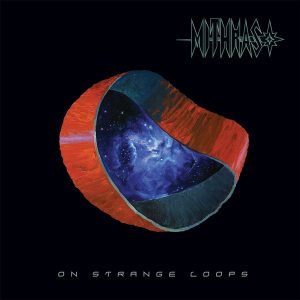
It’s been a hell of a year for cosmic-themed metal across all sub-genres. Black, thrash and death all saw albums released under their respective banners that embraced the mysteries of deep space, either as full-on conceptual conceits or more subtle thematic frameworks. While Blood Incantation will rightly receive the bulk of attention for representing death metal’s take on the horrors lying in the inky blackness of space, my vote is for Mithras’ On Strange Loops. The now-solo act’s (bassist and barker Rayner Coss left the band, again) first album in nine years is an absolutely bonkers collection of guitar histrionics and busy, fill-heavy drumming. Unlike their deathy brethren in Colorado who embraced old school analog recording tactics, Mithras opted to turn the shit up to 11 and go balls to the wall for about 90% of On Strange Loops’ 56 minutes. The only respite comes in the form of a few ambient intros, just enough time floating in the void before being sucked into the singularity once more. Sure, there’s not much room for subtlety here, but that’s not what mainman Leon Macey does best. Instead, he excels at both perplexing listeners with non-Euclidean leads (that tone!) and pummeling them into cosmic dust with labyrinthine riffs as confounding as the Mobius strip on the album’s cover.
Listen Here
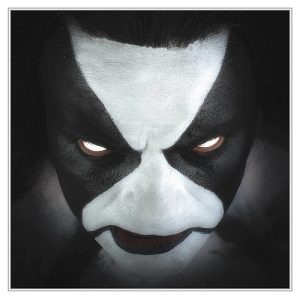
So, what the hell are Immortal going to do now? I ask only because the success of the Immortal brand is contingent on its riffs, and Abbath seems to have taken all of them with him. After being summarily sacked in 2015 from the band he founded, the man born as Olve Eikemo decided to take his riffs and go home. No, not to Blashyrkh, the frostbitten kingdom in which Immortal set their paeans to all things icy and necro. Instead, the Painted One made the ultimate rockstar move and created a band under his own moniker, drafting Norwegian black metal staple King ov Hell on bass and French drummer “Creature” (wünderkind Kevin Foley) to fill out his lineup. The resulting sound is not unlike the unholy ruckus Abbath conjured with I, the Motörhead-gone-corpsepaint supergroup he fronted in 2006 who dropped one killer LP and promptly split. Those of you fortunate enough to have heard Between Two Worlds will know what to expect here (and if you haven’t, the hell’s wrong with you?): Abbath (the man) brings big-ass riffs rooted as much in second wave Norwegian grimness as they are in classic hard rock and ‘80s speed metal, while the rest of the Abbath (the band) ably back him. King kills it on the low-end while never overplaying, his basslines fluttering above the slicing guitar chords on key moments like the climax of single “Winter Bane,” while Foley alternates between four-on-the-floor AC/DC and steady double bass, only using blasts to increase the tension and never as a crutch. In retrospect, Abbath (the album) was inevitable, the first breath of a new life for an icon who’s been equal parts worshipped and memed.
Listen Here
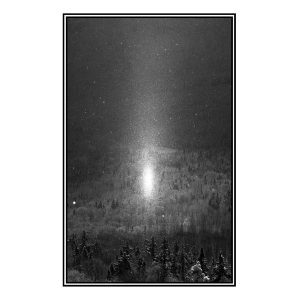
I’ve been enchanted with Quebec’s small but prolific black metal scene since I heard Ephemer’s second EP/demo Notre honneur immortel back in early 2014. The production pushed the boundaries of acceptability even for underground black metal, but buried underneath the midnight fog and cavernous cries were otherworldly melodies, beautiful lead guitar work that spoke to something more triumphant than the depressive black metal en vogue at the time. In contrast with their contemporaries in countries like Iceland — whose bands’ dissonance can lean into Gorguts tech death territory — Quebecois bands embrace the primal urgency of pummeling double bass and the simply majesty of clean tremolo lines.
As such, Cantique Lépreux’s debut is the platonic ideal of the Quebec sound. Boasting members of luminaries like Forteresse and Chasse-Galerie among its ranks, the band is something of a supergroup, and Cendres célestes might be the best place to start for anyone curious about the notoriously cloistered group of musicians that comprises the scene. For starters, it’s one of the few Quebecois releases available in a digital format instead of a scarce run of cassettes. But more importantly, it’s just a damn fun collection of mostly up-tempo black metal. It’s as hooky as anything from the Ephemer catalogue (that solo on “Transis.” Damn!), but all recorded and mixed in a way that won’t automatically turn off those who can’t name their favorite riff from Métal noir québécois.
Listen Here

Alcest could have gone a few different ways after Shelter, 2014’s beguiling post-rock excursion that saw Neige ditch any pretense of black metal for an “all ethereal, all the time” approach. Many predicted he would go full shoegaze, abandoning extreme music forever in favor of following his idols Slowdive and Ride. Yet in much the same way previous tourmates Deafheaven defied expectations with the death metal-tinged New Bermuda after breakthrough Sunbather, Kodama is the heaviest Alcest album, well, probably ever. Songs like “Eclosion” and “Je suis d’ailleurs” bristle with punchy drumming and biting riffs, Neige balancing his near-falsetto croon with equally high-pitched shrieks, the most harsh vocals of any record in the Alcest discography. But it’s that balance that makes Kodama such a perfect synthesis of the Alcest sound, its seamless exchanges of light and dark an aural representation of the Miyazaki films and Japanese spirituality Neige acknowledged as the album’s inspiration. Kodama moves in shades subtle and overt, its compositions winding around rich melodies built in the classic traditions of the great rock songsmiths of yore. There’s a maturity here, a patience to allow each note to evolve and flourish while retaining enough urgency to truthfully be described as “metal.” But, above all proselytizing for Neige’s deification, arguing about what the hell to call it or waxing poetic about the frailty of life and humanity’s relationship to nature, these are beautiful — at times primal — songs, and beautiful music will transcend any genre label one tries to apply.
Listen Here

There are plenty of reasons to love the fourth album by Russian death-doom quartet The Morningside. It trudges, howls and aches with the richly deep emotional impact of the early 90s Peaceville roster. And that’s all well and good, and certainly laudable. But really, Yellow is all about the guitar leads. That’s the big selling point here. Because, damn, whichever one of the guitarists in the band is slinging these things deserves some sort of Don Anderson Certificate of Emotive Shredding or something. Trust me, I do not use that comparison lightly. Anderson is probably my favorite living guitarist. For anyone who mourned the death of Agalloch this year, listen to Yellow. Let the stately melodies of “As a Pilgrim” and “Out of Nest” move you as they blend the very definitions of what constitutes a lead or a solo. Where does one end and the other begin? Does it matter, as long as it’s cripplingly beautiful? Yellow is still a compelling listen even in its calmer moments. Acoustic breather “Clocks” — with its plaintive clean vocals and subtle strings — is a surprisingly subdued ballad among the mid-tempo stompers. But really, this thing is a clinic for any would-be lead guitarist, or at least a healing salve for any Agalloch fan going through withdrawals.
Listen Here

This is a first for me. As a native Sacramentan, it pains me to say Deftones have never made one of my year-end lists. I’ve always liked them just fine; enjoyed individual songs, sure. But I’ve never loved an entire album’s worth of material. On Gore, I finally get it. This feels like a culmination, something monumental they’ve been building to since late bassist Che Cheng’s coma and subsequent passing. After Sergio Vega of NYC post-hardcore heroes Quicksand joined as Cheng’s replacement, the band went on a tear with Diamond Eyes and Koi No Yokan, each album a remolding and rediscovering of the Deftones sound. Gore is Deftones at peak Deftones. Advanced press was rife with reports of conflicts between vocalist Chino Moreno and guitarist Stephen Carpenter, a tension seemingly integral to the band’s identity. Both get their two cents in, Moreno continuing with the shriek/croon dynamic that has become his vocal trademark since breakthrough White Pony, and Carpenter countering with eight-string, Meshuggah chugs tempered with some of his most atmospheric work to date. Yet it’s on songs like “Doomed User” — with Carpenter’s djent-y intro and gnashing chorus punctuated by Moreno’s soaring voice — where Gore is at its best. This is the sound of two strong, divergent personalities compromising for the greater good of their creation. And Deftones have never been more nuanced or feral.
Listen Here

If SubRosa expand their sound any further, we’ll be forced to create an entire genre just for them. Chamber doom? Americana metal? Goth drone? Over their last two albums, the SLC quintet has created an identity unto themselves, an indefinable essence no other band can replicate. For This We Fought the Battle of Ages continues the expansion, pushing song lengths to near-classical levels with movement structures to match. Conceptually based around Russian author Yevgeny Zamyatin’s landmark dystopian novel We, the album uses its source material’s themes as more of an outline than lyrical conceit. Guitarist/vocalist/bandleader Rebecca Vernon continues her stint as one of the most poignant lyricists in metal, crafting economic phrases to be repeated like mantras. “Choice is too precious / To be wasted on vermin” goes “Wound of the Warden”’s chorus, “That’s how we’ll keep them / Sheltered, fetal, fed and glutted.” It’s a clarion call for modern times, a castigation of all powers telling us how to think, how to feel, how to act. On “Black Majesty,” Vernon and backing vocalist/violinist Kim Pack experiment with vocal melodies, crafting the most exquisite moment in SubRosa’s discography on the call-and-response in the song’s short break. “We love the taste of false perfection – the more the lies, the more we laud,” they exchange. There’s nothing false about For This We Fought’s power, nor SubRosa’s perfecting of a sound all their own.
Listen Here

Astronoid feel like the end phase of a movement begun by Alcest and continued by Deafheaven. Call it the “Is This Metal?” revolution. On paper, Air ticks numerous boxes for extremity. Shredding guitars? Check. Relentless blasting and/or double bass drums? Here. Stupendous technicality? Yep. But listening is a different story. The young Boston crew pull off an impressive magic trick, blending all of the above elements into something anti-aggro, something…happy. Joyful even. Sure, you could credit founder and frontman Brett Boland’s boyish vocals, occasionally hitting shoegaze or, dare I say, even pop punk registers. Additionally, these songs are unanimously in major key, exuding hope in both notes and words. On the standout title track — with its driving djent chug made for compulsory headbanging — Boland sings an earnestly hopeful line over proggy shred: “The unknown beginning to shine / The future is better than bright.” But that’s still not quite it. There’s something ineffable about Air, something as ethereal as its very title. Which brings us back to the foundational question: Is this metal? I don’t know. Others have had their takes on both sides of the divide. It’s heavy, sure. Technical, absolutely. The difference here is that Astronoid is using that technicality, that musicianship to convey relentless positivity. While aggression has been one of the core tenets of metal since its founding, we’ve seen enough bands break its other formerly unshakable rules and come through the True Detector relatively unscathed. Why can’t Astronoid?
Listen Here
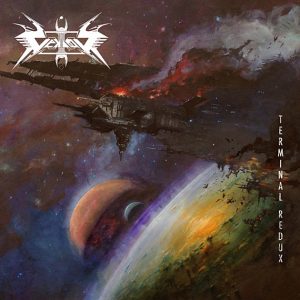
Terminal Redux is completely ridiculous. At 73 minutes with no more than a few spare minutes of atmospheric breathing room every song or two, it’s an album packed with riffs, shred and more riffs. It’s also the fulfillment of an implicit promise the Philly by way of Tempe next-gen thrashers made with 2009 debut Black Future: that they would deliver us from the mediocre, cookie cutter “rethrash” movement and become the only unique voice in a generation of identical bands. But on their third album, Vektor have gone one step further, claiming a spot as one of this era’s great metal bands, regardless of sub-genre.
Their overachievement is unsurprising when you sit down and actually listen to Terminal Redux, a full-on thrash space opera concept album continuing the sci-fi storyline from 2011’s Outer Isolation. It’s an album to get lost in, to wander among the world’s guitarist/vocalist David DiSanto builds so richly, an album of such winding compositional complexity I still haven’t memorized the songs after dozens of listens. Each listen still reveals surprises, twists and turns around increasingly familiar melodies. And what sophisticated melodies there are, as much vintage thrash as ‘70s prog, DiSanto and co-six-stringer Erik Nelson painting with an ever-expanding palette, burnishing primal scorchers like “Ultimate Artificer” and “Psychortopia” with a balance of hooky riffwork and futuristic, fittingly alien leads. While none of this is news to the already converted, the big surprise is “Collapse,” a delicate ballad turned barnburner that sees DiSanto ditching his shriek for whisperlike, Paul Masvidal singing. By the time the free-jazz solo steadily escalates to a climactic, ringing lead, the release feels earned, the succeeding burst of blast beats and shred and another triumphant solo and yet another giant riff all the right amount of batshit crazy to fit the album itself. And that’s just the precursor to the album closer, a mini-epic unto itself. Terminal Redux would be excessive if it didn’t leave us wanting more.
Listen Here

I’m still not sure how this happened. A small, formerly one-man black metal band from Minnesota unseating a juggernaut like Vektor at the top spot. I really can’t put into words how Yūgen makes me feel, and I’ve listened to it more than any album this year by quite a considerable margin. The moment before each playthrough brings a tangible anticipation, a knowing of what is to come. There’s a very specific genus of black metal sprouting across America with unifying but not quite universal tropes. A woodsy quality with Falls of Rauros, an eclectic palette of traditional American acoustics with Nechochwen and a deeply personal touch with Panopticon, none of which are exclusive to any band.
Ashbringer embody all of these attributes and embrace them passionately while imbuing their sound with heartfelt emotional heft. Yūgen has been described as a screamo album by a few writers, and it’s hard to argue with founder and frontman Nick Stanger’s preference for feeling over pristine musicianship. But isn’t that one of the foundations of black metal? The eschewing of the blistering technicality of its sibling genre death metal for a rawer catharsis? Stanger’s songwriting bridges confessional with transcendental, traveling the path laid out by Cascadian forebears Wolves in the Throne Room. Somehow, it feels even more honest, his lyrics true Walden-level prose. “I became peace / I became chaos / And for the first time / I felt balance,” Stanger shouts on “Celestial Infancy,” a backdrop of ringing tremolo building to mantra-like levels of release, one of the many melodies to reach such a state. This isn’t a new trick. Black metal bands have been seeking transcendence through repetition since at least Filfosem. Ashbringer just embody the spirit with more devotion than any of their stateside peers.
Listen Here









